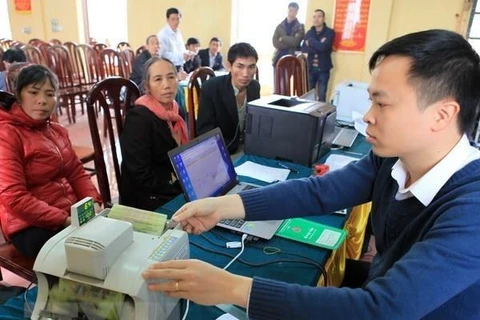Hanoi (VNA) - The capital amounts may be small to many urban families but thanks to them, those in rural and ethnic minority areas have escaped poverty and enriched themselves.
Social policy credit has come to all wards, communes and towns nationwide, focusing on poor and ethnic minority households in remote, especially disadvantaged, border and island regions.
Policy credit programmes helped reduce the rate of poor households to 4.25 percent from 14.2 percent during the 2011-2015 period. The multi-dimensional poverty rate also dropped from 9.88 percent in 2015 to 5.23 percent in 2018.
Since 2016, the poverty reduction rate has exceeded the annual targets set by the National Assembly, as well as the National Target Programme on Sustainable Development. Specifically, the national poverty reduction rate averages over 1.5 percent each year, and stays high at 5.5 percent annually in poor districts.
Stepping out of poverty
No one thought that Hang A Vang, a H'Mong local in Pa Khen I sub-area, Moc Chau farm township, Moc Chau district, Son La province could become better off like now with 1ha of plum trees, a pair of breeding cows, 2 sows, 1,800 chayote trees, a spacious house and a guest house for tourists.
After returning from the army in 2012, Vang got married and inherited 2,000sq.m of land from his parents. He and his wife set up a temporary house there and worked as manual workers to cover their daily lives.
They were later allowed to receive a loan worth 30 million VND (1,300 USD) from the Vietnam Bank for Social Policies’s branch in Moc Chau district for a duration of three years. With the loan, they bought two breeding cows and 2,000 sq.m of land to grow plum trees. While the plum trees waited for harvest, he intercropped chayote trees to pay monthly interests and deposit money for saving.
After harvest, he paid off the debt. In 2015, with the help of the township women's union, he applied for a five-year loan worth 50 million VND under a lending programme for households living near the poverty line. He then bought another pair of breeding cows, seedlings, fertiliser and 3,000 sq.m of land to grow plum trees. His family has become well-off since then.
Like Vang's family, Ha Xao Xuyen, 62, a Muong ethnic minority in Nhoi hamlet, Long Coc commune, Tan Son district (Phu Tho province) also escaped poverty thanks to preferential loans.
It was not until 2010 when his children grew up, he was determined to borrow 30 million VND to buy a pair of breeding buffalos.
Five years later, he sold buffalos to pay debt and even built a small house for his family. In 2015, he again borrowed additional 30 million VND to raise buffalos and grow 1ha of tea. Recently, he has invested in 30 beekeeping boxes and collected 40 litres of honey.
From 2016 to August 31, 2019, nearly 8 million poor households and other policy beneficiaries borrowed over 221.69 trillion VND from the Vietnam Bank for Social Policies (VBSP), and more than 1 million of them surpassed poverty line. Over 775,000 jobs were created, while about 4.9 million clean water supply and rural environment hygiene works and more than 108,000 houses for the poor were built.
 Thanks to preferential loans, the family of KBRop in Kao Kuil village, Di Linh district, Lam Dong province is able to expand coffee cultivation area, earning hundreds of millions of VND (Photo: VietnamPlus)
Thanks to preferential loans, the family of KBRop in Kao Kuil village, Di Linh district, Lam Dong province is able to expand coffee cultivation area, earning hundreds of millions of VND (Photo: VietnamPlus) Limiting “black credit”
A leader from the Central Highlands province of Lam Dong said loan sharking has appeared in the province since 2016, including in ethnic minority areas.
However, a recent report by the VBSP said the problem has eased because many needy families have turned to saving groups in villages for loans.
Additionally, loans from the Vietnam Bank for Agriculture and Rural Development (Agribank) have also served as a solid pad for farmers to escape poverty and enrich themselves.
Over 70 percent of Agribank’s outstanding loans are used for agriculture and rural development. Over the past more than three decades, the lender has launched seven policy credit programmes and two national programmes on new rural development and sustainable poverty reduction.
As of February 28, Agribank made over 3,600 deals via mobile transaction points and provided services for more than 376,000 customers in 389 communes, with a total disbursement of nearly 1.45 trillion VND.
Agribank General Director Tiet Van Thanh said since early 2019, the bank has earmarked at least 5 trillion VND for consumption lending with a maximum of 30 million VND per contract, contributing to driving back loan sharking.
VPSP General Director Duong Quyet Thang said social policy credit provides an important resource for localities to fully tap their potential./.

























